-

新人教版高中英语必修2Unit 4 History and Traditions-Discovering Useful Structure教案二
This teaching period mainly deals with grammar: The past participle is used as attributive and objective complement.1. Guide students to review the basic usages of the past participle used as attributive and objective complement.2. Lead students to learn to use some special cases concerning the past participle used as attributive and objective complement flexibly.3. Strengthen students’ great interest in grammar learning.1. Help students to appreciate the function of the past participle used as attributive and objective complement.2. Instruct students to write essays using the past participle used as attributive and objective complement.Step1:温故而知新。Analyze the underlined phrases and then sum up the common usages of the past participles.1.(教材P41)They had castles built(build) all around England, and made changes to the legal system.2.(教材P42)They use the same flag, known(know) as the Union Jack,...3.(教材P42)Judy and I had our car parked(park) in an underground car park near Trafalgar Square, where we could get our car battery charged(charge).Common points: f the past participle used as attributive and objective complement.Step 2:过去分词作定语时的意义1.及物动词的过去分词作定语,在语态上表示被动;在时间上,常表示动作已经发生或完成,有时也不表示时间性。Our teacher watched us doing the experiment and gave us a satisfied smile at last.我们的老师看着我们做实验,最后给了我们一个满意的微笑。The plan put forward at the meeting will be carried out soon.会上提出的计划将很快被执行。2.不及物动词的过去分词作定语,它不表示被动意义,只强调动作完成。Many little kids like gathering fallen leaves in the yard.

新人教版高中英语必修2Unit 4 History and Traditions-Reading and Thinking教案二
Step 5 While reading---Task 3Read the text again and answer the following questions.Q1: How many countries does the UK consist of ?4 Q2: What are the four countries of the United Kingdom?England, Wales, Scotland and Northern Ireland Q3: Which two were the first to be joined together ?England and WalesQ4: What are the two chief advantages of studying the history of a country ?The first one is to help you understand more about the country and its traditions.The second one is to make visiting it more enjoyable.Q5: What’s the author’s attitude towards studying the history ?Supportive/positiveStep 6 Post reading---Retell the textThe United Kingdom, Great Britain, Britain, England—many people are confused by (1)_____ these different names mean. In the 16th century, the nearby country of Wales (2) __________(join) to the Kingdom of England. In the 19 th century, the Kingdom of Ireland was added to create the United Kingdom of Great Britain and Ireland. Finally, the southern part of Ireland (3) ______ (break) away from the UK, which resulted in the full name we have today. However, most people just use the (4)_________(shorten) name: the UK. The four countries (5)__________ belong to the United Kingdom work together in some areas. There were four sets of invaders and the last group were the Normans. They had castles (6)_________(build) all around England and made changes (7)__________ the legal system. Studying the history of the country will make your visit much more (8)_________(enjoy). The capital city London is (9)___ ancient port city that has a history (10)______(date) back to Roman times. 1. what 2.was joined 3.broke 4.shortened 5.that 6. built 7.to 8.enjoyable 9.an 10.dating Step 6 Homework

新人教版高中英语必修2Unit 4 History and Traditions-Listening&Speaking&Talking教案二
Listening and Speaking introduces the topic of “Take part in a youth project”. The listening text is an interview about "sharing views on historical sites". Through listening to a dialogue between Chinese and foreign students on the way to the Confucius Temple, students can understand their views on the Confucius Temple, Confucius, Confucius' descendants and Confucius' educational thoughts, so as to realize and think about the profound influence of Confucius and his thoughts on Chinese historical tradition. At the same time, the dialogue naturally integrates English idioms and mentions Shakespeare, the British playwright, so as to provide language materials and context for students to understand English idioms and related cultural allusions, as well as to compare Chinese and foreign cultures, which is helpful for students to understand and express the language such as history, tradition, culture and custom significant impact.Text analysis: listening text is a dialogue between a British student and a Chinese student when he goes to the Confucius Temple. When William, a British student, visited the Confucius Temple, he asked Xiao Kong, a Chinese student, for directions. Xiao Kong was just going to the Confucius Temple to meet with the members of the research group, so they went together and exchanged their views on the Confucius Temple, Confucius, Confucius' descendants and Confucius' educational thoughts. From the perspective of foreign tourists, this paper describes their thoughts on Confucius, the great son of Confucius, who had a profound impact on Chinese history and cultural tradition, and his education.Listening and Talking introduces a visit to a historic tourist destination. Tourism is a common way to understand a country's history, culture, and customs and so on. Students listen to the dialogue between Xiao Yan, a youth hostel Usher, and Paul, a backpacker, to learn about Pingyao's famous historical and cultural attractions and Paul's travel experience and experience as a foreign tourist.

新人教版高中英语必修2Unit 5 Music-Reading and Thinking教案二
1. Get basic information about Eric; read deeply to understand the history and development of the virtual choir.2. Understand what the function of the virtual choir is and how to make a virtual choir.3. Understand the meaning of some languages in the context of the text through question guidance, such as “Many people do not have close friends or contacts who have the same interest in music.” and so on.Step 1 Leading-in1. Answer the following questions.Q1:Do you know the Apps like Tik Tok and Quick Hand?Q2: Do you want to make a Tik Tok video or a Quick Hand video?2. Play a Tik Tok video Step 2: Understanding the title Q1:What does the title mean ?Q2: Is the article a narration or exposition? Why? Q3: Can you change the title ? If you can, what is the title?Step 3: Scanning the whole text and getting the basic information1. Answer the following questions.Q1:Who came up with the idea for a virtual choir?Q2: Where did Eric studied the musical composition?Q3: What is his song?2. Find the main idea of each paragraph3. Deal with some new words.Step 4: Reading carefully to get detailed informationPara 1 How to make a virtual choir1. PreparationA. tools: a virtual camera; an Internet connectionB. hero/heroin: friends or some individuals who have the same interests2. Process

新人教版高中英语必修2Unit 5 Music-Reading for Writing教案二
The Internet celebrity Gao Yifeng. Years ago, he owned 5 companies and the staffs over 1,000, but during the economy crisis, he became nothing but debt. He was so worried that his hair became white overnight. There was a time when he wanted to killed himself. But after listening to the song Start Over by Liu Huan, he decided to cheer himself up. He started a steamed bun shop and gradually became a national chain shops. Now he became successful again.Walter Haddon said, “Music is the medicine of a troubled mind.” Music contains such a pleasant and inspiring force. Music gave him courage and bravery. When he listened to the song, it made his spirit fly like a kite in the wind. Music gave him strength and brought him relief. It was the rock I leant on to become strong and to get through those hard times. I hope none of us have to go through the same kind of suffering that he did. At the same time, we all go through various periods when we feel sad or alone. During those times, music can help us in the same way that it helped him. I hope we all will somehow begin to treasure music and make it a part of our life. Thank you for your listening !5.Revise your writing each other.Does he/she explain how music has changed his/her/someone else’s life?Are some of the rhetorical devices included and used properly ?Does he/she talk about how music makes him/her/someone feel?Is the first word in each sentences capitalised?Does he/she use correct punctuation ?

新人教版高中英语必修2Unit 1 Cultural Heritage-Discovering Useful Structure教案二
This theme of the part is “ Describe people or things in greater detail”. Students have learned the grammar(restrictive relative clauses) in Book 1, and further review and consolidate its structure “prep+relative pronouns(which/whom)” and the relative adverbs(when, where and why), besides students should understand its form, meaning and functions. In this section, students should be able to express the grammar correctly in daily communication and in the writing. 1. Review the basic usages of relative pronouns and adverbs of attributive clauses . 2. Learn to use some special cases about restrictive relative clauses.3. Learn to write sentences with restrictive relative clauses flexibly according to the context.1. Review the basic usages of relative pronouns and adverbs of attributive clauses .2. Learn to use some special cases about restrictive relative clauses.3. Learn tow rite sentences with restrictive relative clauses flexibly according to the context.Step 1. Observe the following sentences, and mark the relative pronouns and the adverbs. 1. After listening to the scientists who had studied the problems, and citizens who lived near the dam, the government turned to the United Nations for help.2. Temples and other cultural sites were taken down piece by piece, and then moved and put back together again in a place where they were safe from the water.Step 2 PracticePlease complete these sentences with relative pronouns and relative adverbs and answer the following questions.Questions: 1. What is the head noun ?2. What relative words should be used ?3. What elements do they act in these sentences ?

新人教版高中英语必修2Unit 1 Cultural Heritage-Reading and Thinking教案二
1. This section focuses on "Understanding how a problem was solved”, which is aimed to guide students to analyze and discuss the challenges and problems faced by cultural heritage protection during the construction of Aswan Dam, as well as the solutions. On the basis of understanding, students should pay attention to the key role of international cooperation in solving problems, and attach importance to the balance and coordination between cultural heritage protection and social and economic development. Students are encouraged to face challenges actively, be good at cooperation, and make continuous efforts to find reasonable ways and means to solve problems.2. Enable students to understand the main information and text structure of the reading text;3. Motivate students to use the reading strategy "make a timeline" according to the appropriate text genre;4. Enable students to understand how a problem was solved;5. Enable students to understand the value of protecting cultural heritage by teamwork and global community;1. Guide students to pay attention to reading strategies, such as prediction, self-questioning and scanning.2. Help students sort out the topic language about protecting cultural relics and understand the narrative characteristics of "time-event" in illustrative style3. Lead students to understand the value of protecting cultural heritage by teamwork and global community;

新人教版高中英语必修2Unit 3 The Internet-Discovering Useful Structure教案二
This teaching period mainly deals with grammar “The Present Perfect Passive Voice.” To begin with, teachers should lead students to revise what they have learned about the Present Perfect Passive Voice. And then, teachers move on to stress more special cases concerning this grammar。This period carries considerable significance to the cultivation of students’ writing competence and lays a solid foundation for the basic appreciation of language beauty. The teacher is expected to enable students to master this period thoroughly and consolidate the knowledge by doing some exercises. 1. Guide students to review the basic usages of the Present Perfect Passive Voice2. Lead students to learn to use some special cases concerning the Present Perfect Passive Voice flexibly.2. Enable students to use the basic phrases structures flexibly.3. Strengthen students’ great interest in grammar learning.1. Help students to appreciate the function of the Present Perfect Passive Voice in a sentence2. Instruct students to write essays using the proper the Present Perfect Passive Voice.观察下列句子特点,总结共同点。1.(教材P28)Much has been written about the wonders of the World Wide Web.2.(教材P28)But the Internet has done much more for people than simply make life more convenient.3.(教材P28)Many people have been helped by the club.4.(教材P28)She no longer feels lonely, and her company has become quite successful.5.(教材P32)Today I thought I’d blog about a question that has been asked many times—how do you stay safe online and avoid bad experiences on the Internet?

新人教版高中英语必修2Unit 3 The Internet-Reading and Thinking教案二
Q5:What's Jan's next goal?Her next goal is to start a charity website to raise money for children in poor countries.Q6:What can we learn from her experiences?We learn that when we go through tough times, we can find help and support from other people online. We learn that we can feel less lonelyStep 5: While reading---rethinkingQ1: What is Jan’s attitude to the Internet ?Thankful/Grateful, because it has changed her and her life.Q2: What writing skills is used in the article ?Examples(Jan’s example, the 59-year-old man’s and the 61-year-old woman’s example)Q3: Can you get the main idea of the article ?The Internet has changed Jan’s life/Jan’s life has been changed by the Internet.Step 6 Post reading---Retell the storyMuch has been written about the wonders of the World Wide Web. There are countless articles (1)telling(tell) us how the Internet has made our lives more convenient. But the Internet has done a lot (2)more(much) for people than simply make life more convenient. People’s lives (3) have been changed(change) by online communities and social networks so far. Take Jan for example, who developed a serious illness that made her (4)stuck(stick) at home with only her computer to keep (5)her(she) company. She joined an online group (6)where she could share problems, support and advice with others. She considered the ability to remove the distance between people as one of the greatest (7)benefits(benefit). She was so inspired (8)that she started an IT club in which many people have been helped. She has started to learn more about how to use the Internet to make society better. Her next goal is to start a charity website to raise money (9)for children in poor countries. Jan’s life has been (10)greatly(great) improved by the Internet.

新人教版高中英语必修2Unit 3 The Internet-Reading for Writing教案二
8. However, the more polite you are, the less likely it is you will be attacked. 然而, 你越有礼貌, 你被攻击的可能性就越小。 Step 8 Writing---the articleHow to stay safe in the online chat roomToday I thought I’d blog about a question that has been asked many times--- how do you stay safe online and avoid bad experiences in the online chat room ? I’m not an expert, but many years as a blogger have taught me a thing or two.First of all, there’s the golden rule of the Internet: keep out of what makes you uneasy. Don’t post comments or click on anything. Second, protect your privacy. Don’t give out too much private information like your address, phone numbers, the ID numbers, etc. Third, be polite. If you are polite to others on the Internet, you won’t be attacked in normal situation. Finally, don’t believe in others easily and never meet someone you met online alone. It is very dangerous.Have you had any bad experiences online, or do you have some good advice for staying safe? Post your comments below!Step 9 Pair workExchange drafts with a partner. Use this checklist to help your partner revise his/her draft.1. Does the writer tell the reader what he/she know about the topic ?2. Are the tips and suggestions well organised ?3. Has the writer defined the new words ?4. Does the author include examples, comparison, or explanations ?5. Does the writer end by asking readers to leave comments and/or suggestions ?6. Can you find any grammar or spelling mistakes.Step 6 HomeworkPut up your revised draft in the classroom or read it to your class.

新人教版高中英语必修2Unit 5 Music-Discovering Useful Structures教案二
4. When he got absorbed in his world of music, he felt as if he could “see” the beauty of the world around him, like he had in his previous life.P·P as adverbial: _________________________________________________________________.Function: _______________________________________________________________________.Step 5 Solid Complete the passage with the words in brackets in their correct forms.Well known as a successful band, the Impact members show quite a few striking qualities. They never ever give up. When _____________(question) by the media, they are not _____________(discourage) and practise even harder. They are improving themselves by attending several master training class. They are united. _____________(fill with) team spirit, they act as a whole, always aiming for glory. Step 6 Difference and similarity from -ingObserve the following examples.1. He went out, shutting the door behind him.=He went out, ________________________________________________________.2. Not knowing what to do, he went to his parents for help.=__________________________________________, he went to his parents for help.Similarity: _______________________________________________________________________________________________________________________________________________________.Difference : _______________________________________________________________________________________________________________________________________________________.Step Practice1. ________ in a hurry, this article was not so good. 因为写得匆忙, 这篇文章不是很好。2. ________ carefully, he found something he hadn’t known before. 他仔细读书时, 发现了一些从前不知道的东西。3. ________ why he did it, the monitor said it was his duty. 当被问及他为什么要这么做时, 班长说这是他的职责
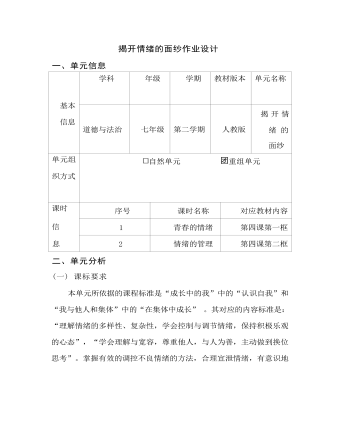
道德与法治七年级下册揭开情绪的面纱作业设计
11.情境探究。成长路上,学无止境。初中三年的学习生活,不仅使我们的知识得到丰富,而且也使我们的心理品质得到磨炼,在生命的旅途中留下 了一串串难忘的印记。根据所学知识,对下列情景进行探究。情景一:面对考试,感到压力很大,心里非常焦虑。对策: 。情景二:数学考试时,小林因为紧张导致许多原本会做的题目做不出 来,就在考场上大哭起来。之后的几天,他吃不下饭、睡不着觉,精 神恍惚,生病了……小林的这种情绪体现了青春期情绪的 特点。 小林的不良情绪会 。 12.阅读材料,体验情绪。材料一 近年来,由于生活、工作压力太大,有一些大公司陆续为员工 增添了一间专门的办公室。这间办公室中设置了真人大小的充气人, 上面标有高层领导的姓名以示区分,员工可随意对其进行拳打脚踢, 并且不用承担任何后果。
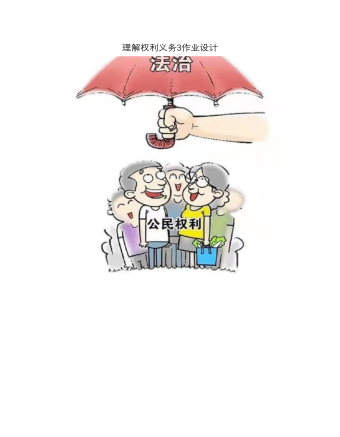
道德与法治八年级下册理解权利义务3作业设计
2.内容内在逻辑本单元为八年级下册第二单元内容。本单元由导语、第三课和第四课组成、第三课“公民权利”设有两课,分别是“公民基本权利”和“依法行使权利”、第四课“公民义务”设有两框,分别是“公民基本义务”和“依法履行义务”。单元导语首先明确中学生在国家中具有公民身份,是国家的主人,依法享受公民权利并承担公民义务。指明公民基本权利和义务是宪法的核心内容,从而激发学生学习公民基本权利和义务具体内容的兴趣。引导学生进一步探究如何依法行使公民权利、如何依法履行公民义务,思考依法行使公民权利、履行义务对个人、家庭、社会及国家的重要意义。引言指明了公民权利对于我们参与社会生活、实现人生幸福的意义,意在引发学生对公民权利在个人成长、社会进步与国家发展方面所具有的价值的初步思考,启发学生思考如何依法行使和维护自身享有的公民权利,进而导入新课。
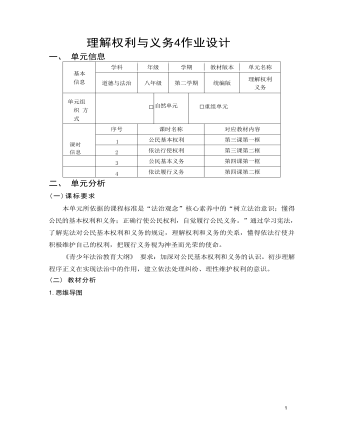
道德与法治八年级下册理解权利义务4作业设计
某小区突发火情。消防中队接警后迅速赶来, 但由于沿途不少车辆乱停放堵 住道路, 消防车无法顺利进入小区。危急时刻, 小区一名热心大姐奋力呼救, 号 召周围居民配合物业人员一起用人力将沿途车辆一一搬开, 这才让消防车顺利抵 达起火楼栋,经过及时疏散,无人员伤亡。某校八(2)班以上述新闻为背景,组织一次以“依法行使权利,让生命通 道畅通”为主题的社会实践活动。请你参与其中。 (1)调查组的同学在某小区发现有一辆私家车占用了消防通道。联系车主后, 该车主说: “我自己的车, 想停哪儿就停哪儿, 哪有那么多火灾! ”请你从“权 利与义务的关系”的角度对其进行劝说该如何处理好权利和义务的关系。①公民的权利与义务相互依存、相互促进。 ②公民既是法定权利的享有者, 又是法定义务的承担者。 ③我们不仅要增强权利意识, 依法行使权利, 而且要增 强义务观念, 自觉履行法定的义务。因此, 作为小区居民, 我们在依法行使停车 权利的同时也要自觉履行维护小区消防安全的义务。
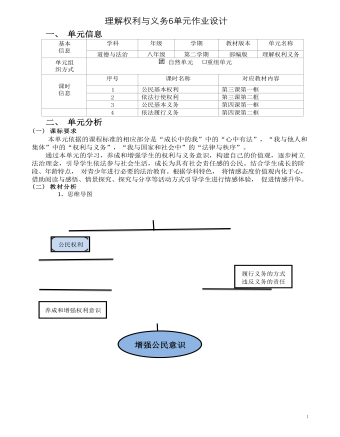
道德与法治八年级下册理解权利义务6作业设计
1.【解析】根据教材所学,依法治国要求全民守法,正确行使权利,自觉履行义务, A项没有履行依法纳税的义务,排除; B项没有履行服兵役的义务,排除;C项侵害救火英雄的名誉权,是一种违法行为,要承担相应的法律责任,故排除;D项自觉履行了维护国家安全和利益的义务,故符合题意。【答案】D2.【解析】该题考查公民的权利和义务的关系; 依据课本内容,公民的权利和义务是一致的。公民的权利和义务是密不可分的, 没有无义务的权利,也没有无权利的义务;题干中“不愿履行或轻视义务”割裂了权利与义务的关系,没有树立起正确的权利义务观念。 所以A项正确; BCD错误。【答案】A。3. 【解析】本题主要考查遵守宪法和法律这一公民基本义务。遵守和维护社会秩序是这一基本义务的具体要求,不服从国家疫情封控管理属于扰乱社会秩序的违法行为, 要承担一定的【答案】(1) 劝阻爸爸。(2) 自觉维护社会秩序, 依法履行公民义务, 法律要求的必须做,禁止做的坚决不做,否则就会受到法律制裁。
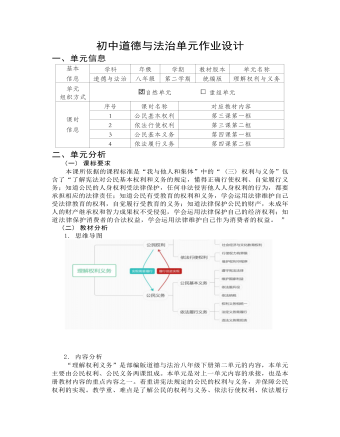
道德与法治八年级下册理解权利义务7作业设计
②积极参与国家事务和社会事务的管理③在享有劳动权利的同时,也履行了劳动的义务④既获得了劳动报酬,也为国家和社会作出了贡献 A.①② B.②③ C.①④ D.③④11.2020 年 6 月 19 日,国家林业和草原局、农业农村部发布通知,就《国家重点 保护野生动物名录》公开征求意见。画眉、啄木鸟、田螺等被增列入名录中,55 个鲸豚类和猛禽类等物种保护等级升级。作为中学生,保护野生动物是:( ) A.法律禁止做的,我们坚决不做 B.法律要求做的,我们必须去做C.道德要求做的,我们积极去做 D. 自觉自愿行为,可做也可不做 12.遇到交通肇事,不按照正常程序处理,而是采取极端的方式解决。陕西省榆 林市公安局榆阳分局镇川派出所,对涉嫌非法入侵他人住宅的 5 名嫌疑人刑拘。 这表明:( )①公民的住宅不受侵犯②禁止非法搜查或者非法侵入公民的住宅③公民权利如果受到损害,要懂得依照法定程序维护权利④我们在行使自由和权利的时候,不得损害其他公民的合法的自由和权利
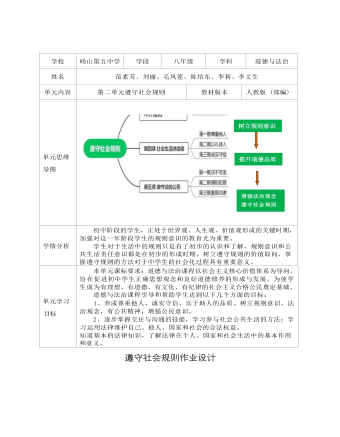
道德与法治八年级下册遵守社会规则作业设计
作业设计是老师布置给学生学习任务的设计,是教学设计的有机组 成部分。它以学习目标为起点,以学习内容为依托,以学习评价为保障, 以发展学生素养为最高标准。作业设计的要素包括作业内容、时间要求、 设计意图、作业分析及作业评价。我们八年级道德与法治组将单元作业 设计为三部分,第一部分是课时作业,本部分通过设置习题和活动,达 道巩固知识立德树人的目标。第二部分是单元作业,主要是为了检测学 生是否达到了单元学习目标,这部分重点考查学生对基础知识的掌握情 况。第三部分是特色作业,增强家国情怀,提高主人翁意识,更加注重 学生的能力提升。进入八年级,知识内容不断加深,同学们在学习方面面临着更大的 挑战,一部分学生因此产生畏难情绪,感觉学习吃力,如果在作业设置 方面,设置的作业量过大或过难,容易让学生彻底失去学习的兴趣,从 而放弃学习。
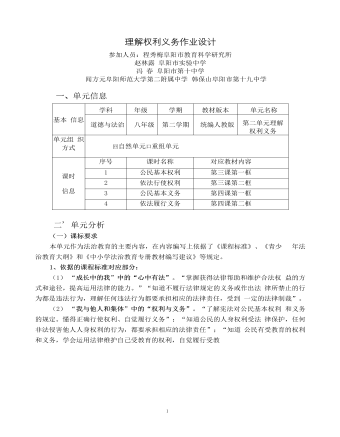
道德与法治八年级下册理解权利义务作业设计
4.阅读材料,回答问题:疫情防控期间,一方面,公民面临着被感染的风险,有权获得政府和社会组 织提供的专业服务与保障。为此,国家有关部门出台了免除个人医疗费用负担的 政策,让广大患者消除了疾病治疗的后顾之忧。另一方面,公民也应当成为疫情 防控中的责任主体之一,依法履行自己的义务,如实报告自己的健康状况,配合 相关管理部门做好居家隔离。(1)结合材料,分析公民行使权利与履行义务之间的关系。(2)作为青少年,我们应该如何履行法律义务?5. 阅读材料,回答问题:2021年3月1日,《中小学教育惩戒规则(试行)》(以下简称“《规 则》”)正式施行。《规则》指出,学生有下列情形之一,学校及其教师应当予 以制止并进行批评教育,确有必要的,可以实施教育惩戒:(一)故意不完成教 学任务要求或者不服从教育、管理的;(二)扰乱课堂秩序、学校教育教学秩序 的;(三)吸烟、饮酒,或者言行失范违反学生守则的。
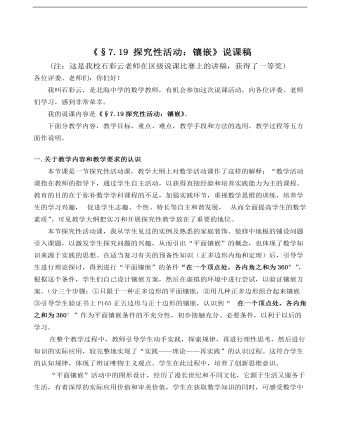
初中数学人教版八年级上册《719镶嵌》说课稿
一.关于教学内容和教学要求的认识 本节课是一节探究性活动课,教学大纲上对数学活动课作了这样的解释:“数学活动课指在教师的指导下,通过学生自主活动,以获得直接经验和培养实践能力为主的课程。教育的目的在于弥补数学学科课程的不足,加强实践环节,重视数学思维的训练,培养学生的学习兴趣,促进学生志趣、个性、特长等自主和谐发展, 从而全面提高学生的数学素质”。可见教学大纲把实习和开展探究性教学放在了重要的地位。
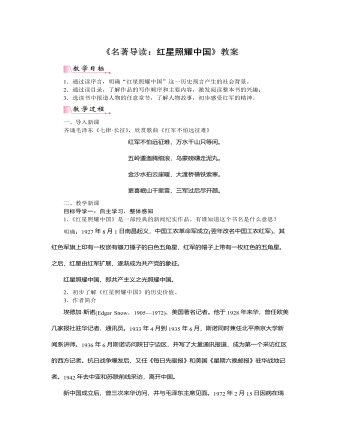
部编版语文八年级上册《名著导读:红星照耀中国》教案
读序言,可以了解内容概要、写作缘由和过程,明确写书的纲领和目的。学生活动一:用5分钟时间浏览一篇序言(译者序和作者序任挑一篇),运用跳读法采集信息点,记录在便利贴上。并互动交流。小结:序言告知我们,“红星照耀中国”是作者在中国及世界局势即将发生大转变的关键一年,冒险来到西北红色区域采访后得出的结论。那么他在苏区见到了什么,听到了什么呢?让我们把视线焦点集中到他笔下那一群“不可征服”的革命青年身上。(二)读目录,了解主要内容及写作顺序1.学生浏览目录,说一说,这本书的写作顺序是怎么样的?主要写了哪几方面的内容?【方法指导】读目录,可以对作品的内容要点和篇章结构有所了解,迅速查阅到所需要的部分。明确:《红星照耀中国》是一部文笔优美的纪实性很强的报道性作品。作者按照事件发生的自然时间顺序真实记录了自1936年6月至10月在我国西北革命根据地进行实地采访的所见所闻。该书绝大部分素材来自作者采访的第一手资料,向全世界真实报道了中国和中国工农红军以及许多红军领袖、红军将领的情况。








